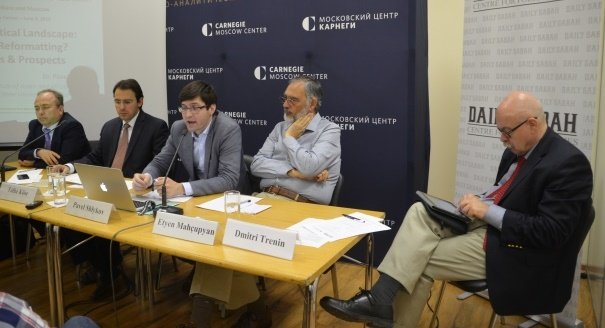Registration
You will receive an email confirming your registration.
In the new global landscape, regional powers such as Turkey will be crucial for maintaining stability. The Carnegie Moscow Center, jointly with the Turkish Daily Sabah Centre for Policy Studies, held a conference in the run-up to the parliamentary elections in Turkey on June 7. Experts from both Turkey and Russia discussed Turkey’s electoral, economic, and geopolitical future.
Carnegie Moscow Center’s Dmitri Trenin and Serdar Karagöz, editor in chief of the Turkish newspaper Daily Sabah, provided the opening remarks and concluding remarks were provided by Trenin and Pınar Kandemir, director of the Daily Sabah Centre for Policy Studies. Talha Köse, associate professor at the İstanbul Şehir University, Kılıç Buğra Kanat, associate professor at Penn State University, and Trenin each moderated a session.
Discussion Highlights
- Elections: Etyen Mahçupyan, former senior advisor to Turkish Prime Minister Ahmet Davutoğlu, gave a summary of possible outcomes of the June 7 elections, which he described as critical for the country. Mahçupyan noted that this is the last chance for the opposition to take power, but also the last chance for the ruling Justice and Development Party (AKP) to reform itself. Birol Akgün, director of the Institute of Strategic Thinking in Turkey, and Pavel Shlykov, associate professor at the Institute of Asian and African Studies at Moscow State University, agreed that there is a very real possibility that the left-wing pro-Kurdish Peoples’ Democratic Party will gain seats for the first time ever, but they argued that the AKP will probably remain the dominant power in the system.
- Economy: Economist Sadık Ünay, columnist at Daily Sabah, presented an optimistic view on Turkish economic stability, claiming the government has a solid handle on its fiscal policy. Exports are high, the budget deficit is about one percent of GDP, and the current account deficit can be linked Turkey’s position in the global supply chain, he said. Natalia Ulchenko, senior associate at the Russian Academy of Sciences’ Institute of Oriental Studies, had a more pessimistic view, fearing that Turkey had fallen into the middle income trap.
- Foreign Policy: Gürkan Zengin, news director of Al Jazeera Türk, argued that Turkey has a new self-confidence and is following more independent foreign policy directives, attempting to maintain good relations with all of its neighbors. Victor Nadein-Rayevsky, senior research fellow at the Russian Academy of Sciences’ Institute of World Economy and International Relations, expressed hope that, even though political interests of Turkey and Russia sometimes differ, the economic relationship between the two countries would continue to blossom.
